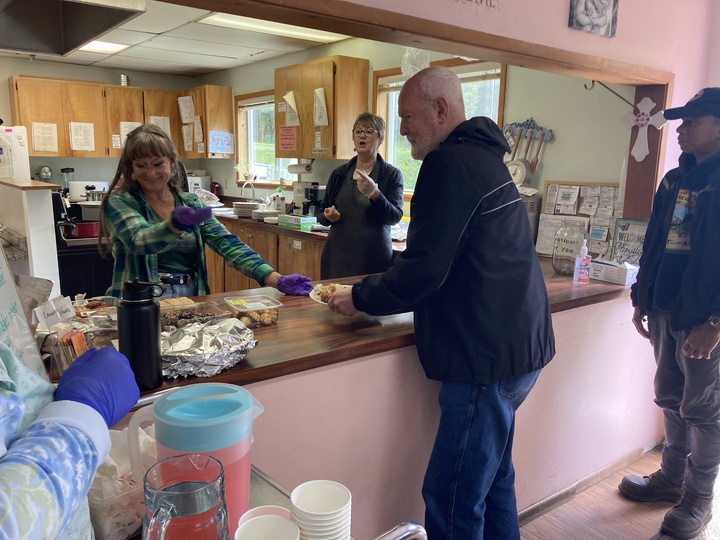Jessica Cejnar Andrews / Monday, July 31, 2023 @ 4:56 p.m. / Homelessness, Local Government, Oregon
St. Timothy's Appeal Against City Abatement Notice Goes Before Brookings Planning Commission Tomorrow

Jay Lindsay gets lunch from Smith River United Methodist Church volunteers at St. Timothy's Episcopal Church in this May 8 photo. | File photo: Jessica C. Andrews
Previously:
###
Brookings planning commissioners on Tuesday are expected to take up an appeal from St. Timothy Episcopal Church representatives against a city threat to fine the church for its community outreach programs.
The meeting will be held at 7 p.m. Tuesday in City Council Chambers at 898 Elk Drive in Brookings.
Church representatives submitted written testimony along with their appeal to planning commissioners on June 27. They requested, and were granted, an additional seven days to allow commissioners to read the testimony before they made a decision, according to St. Timothy’s pastor, Reverend Bernie Lindley.
“Whatever they come up with, people are going to be watching,” Lindley told the Wild Rivers Outpost on Monday. “We’re going to have some people there to film it.”
Brookings’ April 14 abatement notice threatened to fine St. Timothy up to $720 per day for operating a “benevolent meal service” without a permit. The city also took issue with the church’s day program, which includes offering showers to the needy, providing a place for them to charge their phones and access the internet as well as access to legal aid and other services, which the city says is not allowed in a residential area.
In his June 27 report to the Planning Commission, Public Works Director Tony Baron stated the church predates the Brookings Land Development Ordinance, which was adopted in 1989, and therefore it was considered a legal non-conforming use at the time. The church added 392 square feet to its building as well as eight new parking spaces in 1999 — a “minor change” that the Planning Commission approved.
Baron stated Brookings officials became aware of the church’s programs through the discovery phase in the lawsuit St. Timothy has filed against the city.
Baron challenged the church’s argument that its day and advocacy programs and its legal aid clinic are a church’s typical functions and they didn’t have to seek city permission.
“No support is found in the attorney’s letter to show that all of the uses provided by the Church’s programs such as showers, legal clinics and healthcare are ‘typical’ elements of a church,” the city staff report stated.
Baron also cited the Merriam-Webster Dictionary and the Oxford English Dictionary definitions of church as a “building for public and especially Christian worship” in his report.
“The city is not aware of any information suggesting that when people are seeking and obtaining social services at St. Timothy’s there is any worship/religious service being performed,” Baron stated in his report.
In a July 3 letter to the city, Lindley said the current parish hall and kitchen, along with two offices, a library, the sacistry and two bathrooms, one of which includes a shower, were installed 1982.
In 1984, the church began hosting a food bank that relocated to a larger building in about 2004 or 2005 when it relocated to a larger space. Low-income residents, both housed and unhoused, were served at the food bank, Lindley said.
Homeless individuals have often joined Wednesday Bible studies since about the 1990s, according to Lindley’s letter. They would be offered coffee as well as tents, sleeping bags and other “hospitable things.”
Lindley said his predecessor, Father Bill, handled much of the church’s outreach during the church’s office hours from 9 a.m.-noon Monday, Wednesday and Friday.
“The same activities occurred — people were able to use the shower, have fellowship with others and receive advice on a range of topics,” Lindley said. “Many people would come in for alms during office hours just like they do today.”
Lindley also mentions the church’s proximity to Azalea Park, which unhoused folks use because it has one of the area’s only public restrooms. Church representatives don’t permit homeless people to sleep at St. Timothy, and they don’t encourage people to go to the park to sleep or congregate.
According to Lindley, the church’s federal lawsuit against Brookings is still in the discovery phase. He said he’s uncertain of the what the timeline is looking like for its case.
St. Timothy filed its lawsuit in January 2022, about three months after the Brookings City Council approved restricting the number of days churches can feed the hungry to two.
In its lawsuit, the church claims Brookings’ ordinance violates its First Amendment rights.
CLICK TO MANAGE